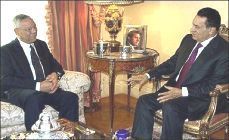Arabs try to brake campaign for sanctions on Sudan
By Nima Elbagir
KHARTOUM, July 28 (Reuters) – Egypt and the Arab League tried to put the brakes on the campaign for sanctions against Sudan on Wednesday as the Sudanese government blamed rebels in the western region of Darfur for the humanitarian crisis there.
 But U.S. Secretary of State Colin Powell said that time was running out for the victims of the conflict in Darfur and the international community should keep up the pressure on Khartoum.
But U.S. Secretary of State Colin Powell said that time was running out for the victims of the conflict in Darfur and the international community should keep up the pressure on Khartoum.
“It is not enough of an excuse to say, ‘Well we don’t want to put sanctions on this regime. We’d rather just see several hundred thousand people go through this terrible period where so many of them will die’,” he told Egyptian television.
The World Food Programme (WFP), which is trying to feed hundreds of thousands displaced by the conflict, said it needed over $100 million more this year to fund its Sudanese activity.
The Sudanese government is under threat of U.N. sanctions if it does not crack down on the Arab militias, known as the Janjaweed, blamed for driving non-Arab villagers off the land in an arid region the size of France. Washington wants the Security Council to vote to set a deadline for sanctions this week.
Khartoum says it is doing its best to comply but needs more time to deploy more forces in Darfur. Relief organisations say the Islamist government has at least made significant improvements on access to Darfur for humanitarian workers.
A minister accused rebels of killing nearly 1,500 civilians and disrupting aid flows since a ceasefire deal four months ago, prompting a major rebel group to deny mounting any offensives.
The international furore over Darfur, where some 30,000 people have been killed in the last 18 months, has produced a backlash in the Arab world, where many suspect that the United States, Britain and their allies in Iraq have ulterior motives.
EGYPT’S CALL
Egypt asked the United States to give Sudan government more time to meet its commitment to stop the Janjaweed, who have set villages ablaze, killed and raped as allies of the government against two rebel movements which took up arms in early 2003.
But U.S. Secretary of State Colin Powell, who was visiting Cairo, replied that inaction could cost lives.
“We should give the Sudanese government time to respond, but these people (the Darfuris) don’t have that much time before disease and famine take tens of thousands of lives,” he said.
“Nobody wishes to make the situation any worse with respect to the imposition of sanctions but at the same time pressure must be kept on the Sudanese government to make sure that access is allowed and that security is improved.”
Egyptian Foreign Minister Aboul Gheit, speaking alongside him, said: “I told the secretary of state of the importance of giving the element of time to the Sudanese government to carry out what it has taken upon itself in the way of commitments.”
Powell voiced impatience with pressure for Sudan to be given up to a month to act before sanctions were imposed: “Why do they need a month? What is it that they need a month to do that they can’t do right now?” he told Egypt’s Al Akhbar newspaper.
But the Arab League, which includes all Arab countries, said sanctions would not help resolve what the United Nations calls the world’s worst humanitarian crisis. Imposing sanctions would put Sudan, an Arab League member, “in a corner (and) not allow it to be an effective partner,” spokesman Hossam Zaki said.
GOVERNMENT ACCUSES REBELS
The Sudanese government accused the rebels of killing 1,460 civilians since a ceasefire in early April.
It was the first time it had given such a figure.
But one of two main Darfur rebel groups said it had not launched any military operations since signing the truce.
“The violations perpetrated by the rebels are delaying the humanitarian aid operations and the operations intending to establish security and the return of the displaced to their villages,” Information Minister Al-Zahawi Ibrahim Malik said.
“The world should push those involved to sit at the negotiating table,” Malik said.
African Union-hosted Darfur peace talks broke down this month when Khartoum rejected the rebels’ conditions for talks.
The African Union said on Wednesday it may beef up its ceasefire observer mission to form a fully-fledged peacekeeping force to disarm the militias and protect civilians. That would take many more troops than the 96 observers now in Darfur. A 270-strong force to protect them already faces delays.
French Foreign Minister Michel Barnier who visited Darfur on Tuesday and has sounded lukewarm on sanctions, said the African Union could solve the problem without wider involvement; Britain has gone so far as to suggest sending troops to Darfur.
“I think the African Union has the capacity and the will to take charge of this crisis at an African level,” Barnier said.
The World Food Programme said in a statement it had reinforced its transport fleet in Sudan with 25 all-terrain trucks to deliver food to outlying parts of Darfur during the current rainy season, which makes roads virtually impassable.
